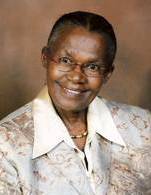Lauretta Ngcobo

Lauretta Ngcobo (1931 – 2015 ) Ngcobo was in born at Ixopo, KwaZulu Natal, and educated at Fort Hare University. The rural community of Ixopo is described in her novel, And They Didn’t Die (1990). She praises the rural women as unsung heroines, whose struggles and complexities in harsh environments were further compounded by having to deal with the hardships of apartheid. As Lauretta Ngcobo’s husband was at the heart of the struggle against the apartheid regime she was consequently ‘married’ to the political struggles of the South African people.
In 1963 Lauretta Ngcobo left South Africa, escaping imminent arrest, and went into exile with her husband and children, moving from Swaziland to Zambia and finally settling in England where she worked as a teacher for 25 years.
In 1994 she returned to South Africa where she served as a member of the KwaZulu-Natal Provincial legislature. Soon after she left South Africa, Lauretta started writing, but it was not until 1981 that her first book, Cross of Gold, was published. This is a book of which she says “I was contemplating what had catapulted my life into exile and how it had all come about”. Let it be Told recounts the turbulent thoughts of black women writers in Britain in the 1980’s, told in their own words.
Lauretta Ngcobo found writing for children, however, gave her the greatest challenge as a writer. She has also written and published many academic papers, attended many writers’ conferences, delivered papers in various universities and travelled extensively as a consequence. Of her book And They Didn’t Die, Prof Mazisi Kunene writes, “This is the most enlightened and balanced book written by a woman who is African and who understands clearly the circumstances of African women – their history and their personal anguish.’
In 2006, she was honoured with the Lifetime Achievement Literary Award by the South African Literary Awards, a project of the wRite associates, in partnership with the National Department of Arts and Culture and The Sowetan.
In 2008, she was awarded the The Presidential Award: The National of Order of Ikhamanga which is awarded to South African citizens who have excelled in the fields of arts, culture, literature, music, journalism or sport. She was awarded silver for excellent achievement in the field of literature and it was stated that this was as a result of her work championing the cause of gender equality in South Africa.
In 2015, Ngcobo died in Johannesburg. Her death received widespread attention from members of government, media, the literary community and on Twitter.
Selected Work
From Cross of Gold (1981)
Sindisiwe Zikode lay behind the huge boulder in the silence of the night among the straggly bushes of the barren land. She listened and strained for any sound that would make her feel she had some company; that she was not so utterly alone; but all she could hear was the loud thud of her heart – a heart that reminded her of all her fears, her grievances, the treacherous hopes and the clotted emotions that filled it. In that darkness without breeze or insects or crickets that cheer the night with their hum and song in South Africa, she prayed for one thing only, and she told God that it was the last great request she would ever make to him. She gave promises and turned that sheltering rock into an altar for her penitence. She thought of the past and the future in wide sweeping circles that whirled in her mind till they were spirals that lifted her in supplication to God.
But this great prayer, unlike all her former prayers before her doubts had arisen about God, kept running aground upon her sorrow and wishes. She was waiting there for her sons, Mandla and Temba. They were just beyond the border, a few hours away from her. Those few strands of barbed wire fence stood between her and her children, her home, her husband and her country. Her thoughts about all these dear things raced and chased each other in a circle that came to no end. If only she could be stronger to bear the disappointment, if it came. Would they come that night? Would they be safe? Could they cross silently, undetected, alone, without being accompanied? Would they be able to spot the exact place of “the big boulder”, would the driver see the boulder at night, would the guards go away to their sleep after midnight? Of late they were more alert than usual, they took turns to guard the fence – but the fence was long. God’s hand would guide the Boer police away from her children.
Sindisiwe had suffered much in the past few months, and told herself she could still suffer more if called upon to do so. But again, almost shamefully, she admitted to herself that the courage and defiance that her political training had given her were wearing thin; how else could she account for her frequent relapses into prayer in those last few months? In that formless mute darkness she tried again to merge her belief in God and her belief in herself. She drilled her conscience again into believing that violence is morally better than passive submission; and that acquiescence is evil. She told herself over and over again that it was right that her children should join her in this monastery of her refuge and learn all its disciplines.
Bibliography
1981. Cross of Gold. Washington D.C: Three Continents Press.
1987. Let It Be Told: black women writers in Britain. London: Pluto Press.
1990. And They Didn’t Die. London: Virago Publishing.
1994. Fikile learns to like other people. London: Macmillan Education Limited.
2012. Edited: Prodigal Daughters: Stories of South African Women in Exile. Durban: University of KwaZulu-Natal Press